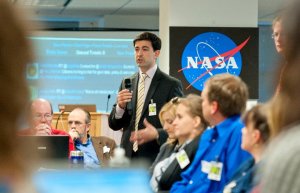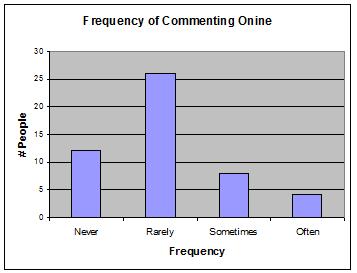President Obama on the importance of civil debate at the University of Michigan commencement speech (source: Huffington Post):
The second way to keep our democracy healthy is to maintain a basic level of civility in our public debate. These arguments we’re having over government and health care and war and taxes are serious arguments. They should arouse people’s passions, and it’s important for everyone to join in the debate, with all the rigor that a free people require.
But we cannot expect to solve our problems if all we do is tear each other down. You can disagree with a certain policy without demonizing the person who espouses it. You can question someone’s views and their judgment without questioning their motives or their patriotism. Throwing around phrases like “socialist” and “Soviet-style takeover;” “fascist” and “right-wing nut” may grab headlines, but it also has the effect of comparing our government, or our political opponents, to authoritarian, and even murderous regimes.
Again, we have seen this kind of politics in the past. It’s been practiced by both fringes of the ideological spectrum, by the left and the right, since our nation’s birth.
The problem with it is not the hurt feelings or the bruised egos of the public officials who are criticized.
The problem is that this kind of vilification and over-the-top rhetoric closes the door to the possibility of compromise. It undermines democratic deliberation. It prevents learning – since after all, why should we listen to a “fascist” or “socialist” or “right wing nut?” It makes it nearly impossible for people who have legitimate but bridgeable differences to sit down at the same table and hash things out. It robs us of a rational and serious debate that we need to have about the very real and very big challenges facing this nation. It coarsens our culture, and at its worst, it can send signals to the most extreme elements of our society that perhaps violence is a justifiable response.
So what can we do about this?
As I’ve found out after a year in the White House, changing this type of slash and burn politics isn’t easy. And part of what civility requires is that we recall the simple lesson most of us learned from our parents: treat others as you would like to be treated, with courtesy and respect.
But civility in this age also requires something more.
Today’s twenty-four seven echo chamber amplifies the most inflammatory soundbites louder and faster than ever before. It has also, however, given us unprecedented choice. Whereas most of America used to get their news from the same three networks over dinner or a few influential papers on Sunday morning, we now have the option to get our information from any number of blogs or websites or cable news shows.
This development can be both good and bad for democracy. For if we choose only to expose ourselves to opinions and viewpoints that are in line with our own, studies suggest that we will become more polarized and set in our ways. And that will only reinforce and even deepen the political divides in this country. But if we choose to actively seek out information that challenges our assumptions and our beliefs, perhaps we can begin to understand where the people who disagree with us are coming from.
This of course requires that we all agree on a certain set of facts to debate from, and that is why we need a vibrant and thriving news business that is separate from opinion makers and talking heads. As Senator Daniel Patrick Moynihan famously said, “Everyone is entitled to his own opinion, but not his own facts.”
Still, if you’re someone who only reads the editorial page of The New York Times, try glancing at the page of The Wall Street Journal once in awhile. If you’re a fan of Glenn Beck or Rush Limbaugh, try reading a few columns on the Huffington Post website. It may make your blood boil; your mind may not often be changed. But the practice of listening to opposing views is essential for effective citizenship.
So too is the practice of engaging in different experiences with different kinds of people. For four years at Michigan, you have been exposed to diverse thinkers and scholars; professors and students. Do not narrow that broad intellectual exposure just because you’re leaving here. Instead, seek to expand it. If you grew up in a big city, spend some time with some who grew up in a rural town. If you find yourself only hanging around with people of your race or your ethnicity or your religion, broaden your circle to include people who’ve had different backgrounds and life experiences. You’ll learn what it’s like to walk in someone else’s shoes, and in the process, you’ll help make this democracy work.
The last ingredient in a functioning democracy is perhaps the most basic: participation.
I understand that one effect of today’s poisonous political climate is to push people away from participation in public life. If all you see when you turn on the television is name-calling; if all you hear about is how special interest lobbying and partisanship prevented Washington from getting something done, you might think to yourself, “What’s the point of getting involved?”
The point is, when we don’t pay close attention to the decisions made by our leaders; when we fail to educate ourselves about the major issues of the day; when we choose not to make our voices and opinions heard, that’s when democracy breaks down. That’s when power is abused. That’s when the most extreme voices in our society fill the void that we leave. That’s when powerful interests and their lobbyists are most able to buy access and influence in the corridors of Washington – because none of us are there to speak up and stop them.
Participation in public life doesn’t mean that you all have to run for public office – though we could certainly use some fresh faces in Washington. But it does mean that you should pay attention and contribute in any way that you can. Stay informed. Write letters, or make phone calls on behalf of an issue you care about. If electoral politics isn’t your thing, continue the tradition so many of you started here at Michigan and find a way to serve your community and your country – an act that will help you stay connected to your fellow citizens and improve the lives of those around you.
It was fifty years ago that a young candidate for president came here to Michigan and delivered a speech that inspired one of the most successful service projects in American history. And as John F. Kennedy described the ideals behind what would become the Peace Corps, he issued a challenge to the students who had assembled in Ann Arbor on that October night: “…[O]n your willingness to contribute part of your life to this country…will depend the answer whether a free society can compete. I think it can.”
This democracy we have is a precious thing. For all the arguments and all the doubts and all the cynicism that’s out there today, we should never forget that as Americans, we enjoy more freedoms and opportunities than citizens in any other nation on Earth. We are free to speak our mind and worship as we please; to choose our leaders and criticize them if they let us down. We have the chance to get an education, work hard, and give our children a better life.
None of this came easy. None of it was preordained. The men and women who sat in your chairs ten years ago and fifty years ago and one hundred years ago – they made America possible. And there is no guarantee that the graduates who will sit here in ten or fifty or one hundred years from now will enjoy the same freedoms and opportunities that we do. America’s success has never been a given. Our nation’s destiny has never been certain.
What is certain – what has always been certain – is our ability to shape that destiny. That is what makes us different. That is what makes us American – our ability at the end of the day to look past all of our differences and all of our disagreements and still forge a common future. That task is now in your hands, as is the answer to the question posed at this university half a century ago about whether a free society can still compete.
If you are as willing, as past generations were willing, to contribute part of your life to the life of this country, then I, like President Kennedy, still believe we can. Congratulations on your graduation. May God Bless You, and may God Bless the United States of America.






 Public officials are busy, and the problems they deal with are complex. We find that no one has time to waste when making decisions, and that’s why the idea of public participation in decision making does not appeal to many public officials.
Public officials are busy, and the problems they deal with are complex. We find that no one has time to waste when making decisions, and that’s why the idea of public participation in decision making does not appeal to many public officials.